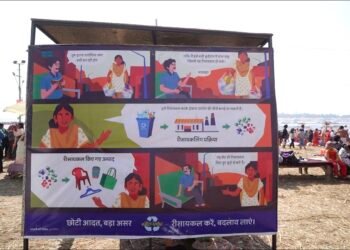It’s time to celebrate social impact. The consistent flow of capital in India’s social sector in the past decade has given the requisite impetus for incubation and nurturing of development professionals and large array of social impact projects. Consequently, development outcomes across income, health and gender have witnessed promising progress, though there is still a long way to go.
In the troika of social development, two things have catalyzed the corporate social responsibility horizon in the past decades—the rising role of private enterprise in India’s economy and an improved efficiency of the democratically elected government to improve the standard of living of its citizens. It is recently, especially in the post Covid world, we are recognizing the third prong of the troika—the huge contribution of civil society and social enterprises.
To accelerate the pace of development, Indian government legally mandated corporate social responsibility on April 1, 2014, making India one of the first countries to bring the progressive legislation. The new rules in Section 135 of India’s Companies Act make it mandatory for certain criterion companies to donate a part of their profit for social and environmental causes such as eradicating hunger and poverty, promoting education and gender equality and promoting healthcare.
The most visible outcome of the new legislation has been the magnitude of philanthropy. The donation from India’s residents has grown from around INR 12,500 crore in 2010 to about INR 55,000 crore in 2018. Contributions by individual philanthropists have also increased in the past decade from 26 per cent in 2010, to 60 per cent of the total private funding in India in 2018.
With so much funds being invested in corporate social responsibility projects in India, there is a growing need towards more structured method to giving, and growth and diversification of the support ecosystem. The C suite Board members are asking the CSR teams, if stakeholder expectations have been met, or if the project is aligned with the organization’s goals—and most important, if the project funded by the profits belonging to the shareholders contributes to the long-term sustainable development of the society.
The introduction of the National Guidelines for Responsible Business Conduct—2018 by Ministry of Corporate Affairs, and The Business Responsibility and Sustainability reporting by SEBO demonstrate the growing evidence of the CSR project design and management maturing to embrace global framework for measuring the impact of the social responsibility projects. Adoption of ISO 26000: guidance on Social responsibility by BIS, India is also a step in the right direction to align the CSR projects in India to speak an international language.
Designing the CSR Projects according to globally accepted standards has a benefit. It helps in assuring the quality of processes and procedures followed in CSR Projects—thus ensuring the credibility, accountability and transparency of the project—something which Indian CSR reporting needs to do more of. Currently, there are many CSR projects which look like black holes—just sucks in huge amount of money with no impact to show.
The time has come for Assurance of CSR Projects, as it builds trust across the spectrum of stakeholders—investors, community, employees and supply chain. And trust, they say, is what drives business excellence.
(Jyotsna Belliappa is Founder of BlueSky Assurance. She is an ISO 26000 Certified Corporate Social Responsibility auditor. She has audited global supply chain on social and environmental risk and managed their impact on the sustainable development of the community. A Certified Independent Director and member of CSR Boards, she is an expert in finding solutions to maximize the social impact of the CSR Projects.)






















